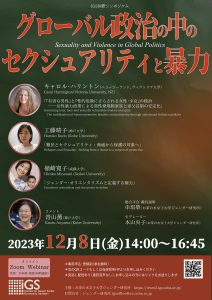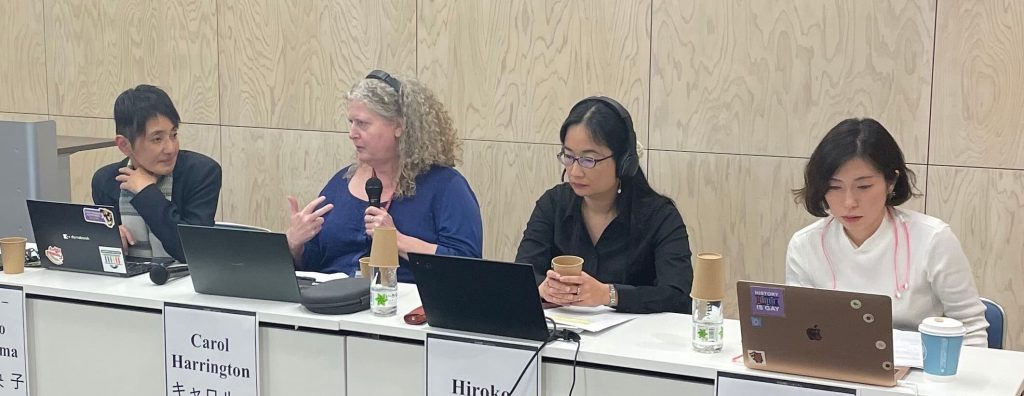2023.12.08 IGS International Symposium
“Sexuality and Violence in Global Politics”
We hosted an international symposium titled “Sexuality and Violence in Global Politics” on December 8th, 2023. In the opening remarks, Ki-young Shin, Professor of Ochanomizu University, stated that the symposium aims to critically examine the relationship between violence and sexuality within the realms of global politics. Since power and sexuality are closely connected, sexuality has been mobilized as the grounds for exclusion and violence. We cannot understand contemporary warfare and coercions without considering these mechanisms of power and sexuality.
During the first half of the symposium, three presentations were delivered, each offering insights from different academic perspectives. Carol Harrington, the first presenter, tackled the concept of “toxic masculinity.” According to Harrington, the term toxic masculinity has its origin in the mythopoetic men’s movement, not in feminism. Various examples of the narrative of toxic masculinity were introduced to show how it reduces gender violence and inequality to the problems of men’s personality, not the economic structure. Attempts to change men’s personalities are justified by the framework of “womenomics,” which promotes women to perform their economic productivity by participating in paid labor. In doing so, toxic masculinity creates a dichotomy of “desirable” men versus “undesirable” men, and that results in authorizing the new leadership of “healthy” men, who are supportive of women. This advantages heteronormativity and patriarchy, and does not enable women to live themselves, Harrington insisted. The presentation concluded with the need to be aware of the effects of toxic masculinity.
The subsequent presenter, Hiroko Minesaki, discussed the gaps between discourse and reality caused by gender orientalism. Minesaki elucidated that violence is predominately defined by the dominant majority, echoing the principles of gender orientalism. Gender orientalism means our gaze to see sexism in the East as “undeveloped” based on the dualism of the West and the East. Gender orientalism leads to ignoring global economic inequalities and political structures. Therefore, we need to carefully consider that from where, by whom, to whom, and for what purpose, “violence” is defined. Using a case study in Egypt, Minesaki illustrated the profound disjunction between discourse and reality concerning honor-based violence. Minesaki suggested that we need to deconstruct gender orientalism by understanding its contexts. What is emphasized is the importance of considering the intent behind discourse in terms of gender orientalism.
Lastly, Haruko Kudo elucidated how queer refugees in the US have been subjects of protection and threat to national security. Around 2010, international organizations began to focus on the issue of LGBTIQ+ refugees and asylum seekers. Inclusion can be welcomed; however, we must also be careful about the narratives surrounding it. Back in history in the US, queer immigrants had been cast as a threat to national security and public health rather than as subjects to protect. The recent US initiatives of advocating for the protection of LGBTIQ+ refugees and asylum seekers have contributed to the formation of global hierarchies; the “uncivilized” South with human rights violations of queer people, and the “advanced” North that protects them. Furthermore, the trajectory of global sexual politics is not straightforward. Policies under Trumpism and COVID-19 pandemics reinforce the exclusion of queer immigrants. Kudo concluded that it is important not only to protect queer individuals but also to problematize the effects of the discourses around LGBTIQ+ refugees and asylum seekers.
At the beginning of the latter half of the symposium, Kaoru Aoyama, the commentator, provided three points for discussion; “why gender/-sexuality politics matter now”, “the dilemma of reclaiming naming”, and “strategies to subvert structural power relations”.
The presenters discussed and audience members engaged in lively discussions regarding these points. Regarding “why gender/-sexuality politics matter now”, participants pointed out that what underlies gender/-sexuality politics is economic issues. Also, it was argued that since gender and sexuality strongly appeal to our bodies and emotions, that helps to overlook the structural problems. In considering “the dilemma of reclaiming naming”, participants acknowledged that although naming makes marginalized experiences visible, it is still important to recognize that naming also marginalizes other experiences and makes them invisible. Addressing “strategies to subvert structural power relations”, emphasis was placed on grasping the gap between discourse and reality and focusing on enabling women to become economically independent.
We shared various questions and points of discussion during the symposium. The symposium closed with the conclusion that these questions should continue to be considered in the future.

Aiko Oguchi (Ph.D. student at Ochanomizu University)
《Event Details》
IGS International Symposium “Sexuality and Violence in Global Politics”
【Date/ Time】December 8th, 2023, 14:00-16:45 (Tokyo)
【Venue】Onsite+Zoom Webinar
【Presenter】
Carol Harrington(Victoria University, NZ)
“Governing toxic men and sexually vulnerable women and girls: The stabilization of heteronormative families and patriarchy through anti-sexual violence policies”
Hiroko Minesaki (Seikei University)
“Gendered orientalism and the power to define”
Haruko Kudo (Kobe University)
“Refugees and sexuality: shifting from a threat to a subject of protection”
【Commentator】
Kaoru Aoyama (Kobe University)
【Moderator】
Hisako Motoyama (Ochanomizu University)
【Organizer】Institute for Gender Studies, Ochanomizu University
【Language】English and Japanese (Simultaneous interpreting provided)
【Number of attendees】144

